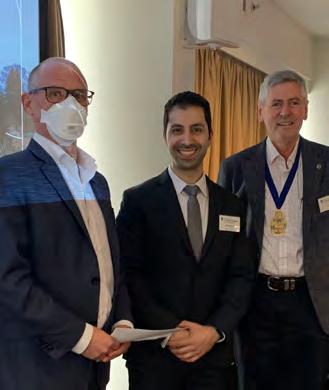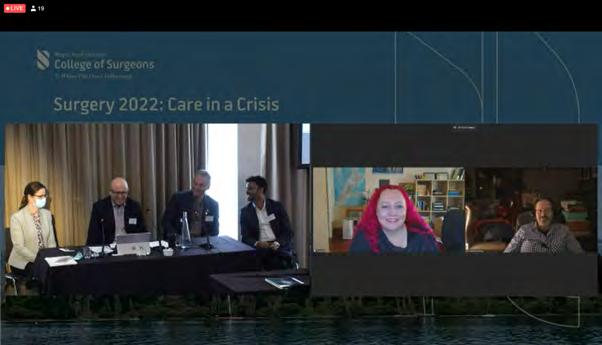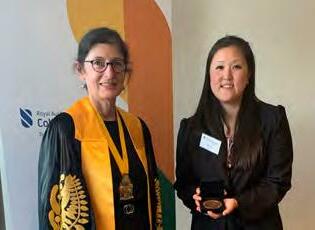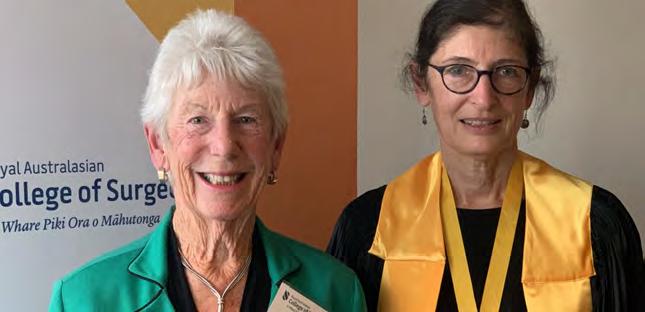
6 minute read
Surgeons reconnect in Queenstown
2
Aotearoa New Zealand (AoNZ) surgeons had the opportunity to reconnect, share ideas and gain valuable new insights at the Annual Surgeons’ Meeting (ASM) in Queenstown. ‘Surgery 2022: Care in a Crisis’ was held across two days, on 1 and 2 September, in the first in-person AoNZ ASM since the pandemic began. The chance to touch base with colleagues from across the motu (country) is one of the things that makes the conference such a calendar highlight according to conference convenor, Dr Ros Pochin. “The speaker line-up was a real draw and we enjoyed hearing the presentations and joining in the discussions. But it is also those incidental conversations, and friendships—both new and old—that make this an annual staple for many.” The strong attendance, despite the continued pressures of COVID-19 and winter illnesses on hospital schedules, was an indication of just how valued it is as a learning and networking opportunity. ‘Surgery 2022: Care in a Crisis’ had 65 in- person participants. In a first for the conference, ‘Surgery 2022: Care in a Crisis’ was livestreamed, with 47 registered to attend the event. Te reo Māori takes centre stage What stood out at this year’s meeting was the use of te reo Māori. Some showed an impressive level of proficiency. Others gave it a go. What was clear was nearly all session chairs and speakers, including non-New Zealanders, wanted to show their respect for the lanugage of the tangata whenua— Indigenous people—of AoNZ. There were also some interesting presentations on Indigenous health, from the sobering exploration by Associate Professor Jason Gurney of disparities in post-operative outcomes for Māori patients to the illuminating insights of Dr Courtney Sullivan, a Rotorua-based doctor, into the Māori attitude to death.
Advertisement
For those who don’t believe there are inequities in the provision of healthcare in AoNZ, Associate Professor Gurney, a Māori epidemiologist and director of the Cancer and Chronic Conditions (C3) Research Group, said you just need to “start with the data. Disparities were found everywhere we looked—especially in elective surgery.” The human side of organ donation What was also of note was how even surgeons, who could be expected to be somewhat hardened to the emotional side of their work, are touched by the human stories behind their patients. The tissues came out towards the end of day one of the meeting as an organ recipient and the family of a donor shared their transplant journey. The deep-dive into organ transplant included former Middlemore nurse and bi-lateral lung transplant recipient Amy Ng-Thomson. Amy’s talk spanned the lows of her health deterioration while on the transplant waitlist to the heights of One Tree Hill (https://bit.ly/3LacTDV). Walking up One Tree Hill is a rite of passage for lung transplant recipients. Amy said making it up to the top and taking in the view felt amazing. “It was like, ‘hell yeah, we made it. We got here’.” Amy was followed by Grant and Fiona Shennan who found a “beautiful light in the midst of tragedy” by donating their 22-year-old son’s organs following a fatal car accident in the USA.
They explained what drove them to ensure their son didn’t die in vain and read letters from those whose lives had been saved by their actions. The future of the pandemic COVID-19 might have dropped out our newsfeeds but its continued impact on the Aotearoa New Zealand health system is significant. Participants were given a stark reminder of how lightly AoNZ came through the early days of the pandemic from those who were in the frontlines of the outbreak. Dr Avinash Sharma, an Auckland-based general surgeon, was living and working in New York in early 2020 and described it as a “full blown catastrophe” as refrigerated trucks were deployed to store the bodies of victims.

1
Associate Professor Siouxsie Wiles, a microbiologist and celebrated health commentator, warned against underestimating “long COVID”. She urged against complacency and said the Emmental Model, where public health measures such as washing hands and staying home when sick are slices of Swiss cheese–each imperfect but strong together, is still our best defence against COVID-19.
Breaking barriers The meeting closed with a session, which included Specialist International Medical Graduates who spoke of the barriers they encountered when trying to follow their passion in a new country. Dr Leanne Shaw, a urologist in Hastings and the Urology Specialty Representative on the RACS Aotearoa New Zealand National Committee also spoke at the meeting. She is one of the 12 per cent of urologists who are female. She is also left-handed and, being short, finds some surgical equipment uncomfortable or awkward to use. She was asked to present on not having the ‘usual’ clinical range. Dr Shaw is an ‘office urologist’ and only sees outpatients.
Images: 1. Panel discussion following the COVID-19 update. From L-R: Dr Sally Langley, Dr Andrew Connolly, Dr David Moss, Dr Avinash Sharma, Associate Professor Siouxsie Wiles, and Dr Matthew Dolling. 2. (L-R) Associate Professor Andrew MacCormick (AoNZNC Chair), 2022 Louis Barnett Prize winner Dr Ahmed Barazanchi and Professor Chris Pyke (Judging Panel Chair).
PRIZES
Congratulations to the prize winners— deferred due to the pandemic—on their incredible work.
Louis Barnett Prize 2022
Congratulations to Dr Ahmed Barazanchi for the 2022 Louis Barnett Prize (https://bit.ly/3dsR8mb). His research shows the surgeon’s ‘gut feeling’ is a good pre-operative risk predictor in emergency laparotomy, a high-risk abdominal surgery. The Louis Barnett Prize has been recognising advanced surgical academic research from AoNZ Trainees and Younger Fellows for the past 60 years. Professor Spencer Beasley, RACS Surgical Advisor, said the quality of this year’s eight finalists, who presented at the meeting in Queenstown, was exceptionally high and covered a broader spectrum of topics and specialties than previous years. He also noted the greater use of qualitative, as well as quantitative research, and the focus on equity and access issues. Deferred RACS ASC prizes ‘Surgery 2022: Care in Crisis’ also provided a chance for two RACS ASC prize winners from 2021 to collect their medals. Both recipients are AoNZ-based and were unable to attend the ASC in Brisbane earlier this year. Dr Morrow received the 2021 John Corboy Medal, which recognises exceptional service by a Trainee. Anna is now a Christchurch-based general surgeon and earned the award for ‘leadership, selflessness, tenacity and service to Trainees set against extraordinary personal tragedy’ former RACS Trainees Association Chair Dr James Churchill said.
Dame Judith Potter DNZM was the recipient of the Companion of the College Award. This honour recognises the contributions of a person to the College and to the community through continued involvement.
Dame Judith, a lawyer and a High Court judge, joined the AoNZ National Committee (AoNZNC)—formerly the New Zealand National Board—as an Expert Community Advisor in 2012 and held the position for nine years. She was one of two AoNZ members on the Expert Advisory Group in 2016 to investigate bullying, harassment and discrimination within surgery and had a role in developing the ‘Building Respect, Improving Patient Safety’ initiative. According to former AoNZNC Chair Philippa Mercer, “Her breadth of knowledge and expertise from the legal profession and her understanding of community issues such as gender bias, has enabled her to offer counsel that is clear, concise and considered. When Dame Judith had a point to make, everyone listened.”

Dr Sally Langley and 2021 James Corboy Medal recipient Dr Anna Morrow











